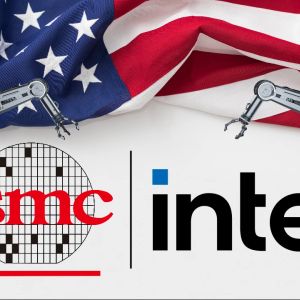Taiwan Semiconductor Manufacturing Company (TSMC) is considering an option to take over and run Intel Corporation’s United States factories. According to a report citing sources familiar with the matter, the idea was conceived by a member of Trump’s team. The takeover means that United States President Donald Trump’s wish to boost manufacturing and maintain American leadership in critical technologies across the globe remains intact. According to the source, the idea was discussed at a recent meeting between Trump’s team and the Taiwanese company, with TSMC considering the idea. However, it remains to be seen if Intel will be open to making it happen. TSMC to discuss running Intel’s factories According to the sources , talks are still at a very early stage, and nothing is expected to happen in the coming days. Reports also mentioned that the structure of a potential partnership is yet to be drawn up. However, according to the person, the endpoint of the whole discussion could see TSMC, one of the largest chipmakers in the world, using Intel’s semiconductor factories in the United States. The conversations are still private and will address Intel ‘s financial position, which has forced the company to cut some of its employees and cancel its global expansion plans. According to the source, the deal may see major chip designers in America take equity stakes, with the US government also providing support. This means that the company will not be fully under the control of TSMC, a foreign company. TSMC is quite popular in the semiconductor market, providing chips to companies like Apple, Nvidia, and others dealing with semiconductors that power AI algorithms. Despite the idea coming from a member of Trump’s team, the deal could still run into a political hurdle, the same one that has prevented Japanese company Nippon Steel Corp. from acquiring United States Steel Corp. According to an official in the White House, it is unlikely that President Donald Trump supports a foreign entity operating Intel’s factories. Intel’s performance and the potential of a partnership Intel posted losses on Friday after the Bloomberg report on the discussions. The stock closed at $23.60, dropping by 2.2% at the close of the market in New York, combining it with a previous drop of 5.3% in an earlier session. The company has dropped significantly over the last five years despite manufacturing the most used components in PCs and server industries. Intel, under its former CEO Pat Gelsinger, embarked on an ambitious move to restore its lead in the chipmaking sector, winning $7.9 billion in government funding to support several projects in four states. The company also secured a $3 billion deal to provide chips for the United States military, and it has already received $2 billion from the entire funds as of January. However, the effort has failed to translate into patronage outside America, especially at a new site in Ohio. The company’s products are also dropping in market shares, compounding its financial woes at a time when it needs to spend heavily. Gelsinger was forced to leave his role in December after the board lost confidence in his plans to turn things around. Although Intel has shown interest in investing in factories in the United States, contingency plans have been discussed by officials in Washington. According to a previous Bloomberg report, a possible plan under the Biden administration was a deal between GlobalFoundries and Intel. The deal could have seen the merger of both companies, but GlobalFoundries said it didn’t have the funds for an acquisition, with the company walking away from the conversation at the time. Another idea was for TSMC to license its manufacturing technology at Intel’s facilities. However, TSMC backed away from the discussion, as it felt it would lead to the benefit of a direct competitor in the industry. That exact conversation was doomed since Biden’s team was reluctant to be active in the conversation. Meanwhile, Trump will not be shy about making a deal, with TSMC looking to be in his good graces after having their meeting in the United States for the first time. While Trump has accused Taiwan of stealing US chips in the past, even threatening tariffs on semiconductors produced by foreign firms, he could have a change of heart. Cryptopolitan Academy: Are You Making These Web3 Resume Mistakes? - Find Out Here













